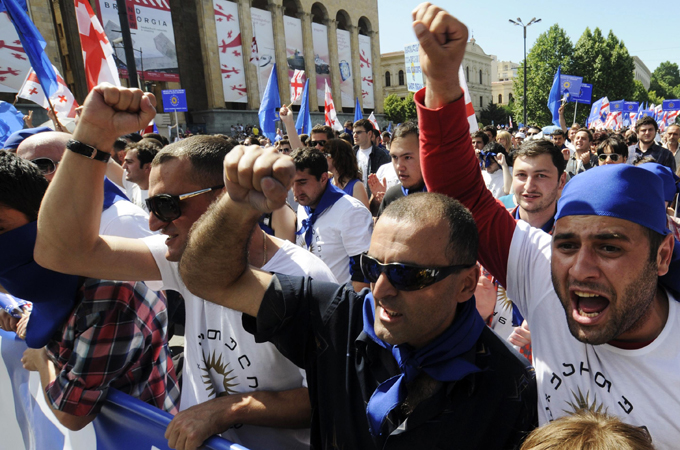
Georgian Dream’s Parliamentary Candidates: Personal Loyalties Unite an Eclectic Lot
Publication: Eurasia Daily Monitor Volume: 9 Issue: 140
By:

The Georgian Dream opposition coalition, and its dominant party of the same name, has presented almost all of its candidates for single-mandate districts in Georgia’s upcoming parliamentary elections. The name “Georgian Dream” applies both to Bidzina Ivanishvili’s party and to the coalition that the Georgian billionaire has built around his party (see accompanying article).
The 68 candidates (five slots are not yet filled) are mostly an eclectic lot. The party’s nominees, comprising more than half of the total, are bound together by Ivanishvili’s generous patronage. These nominees include eight veteran sportsmen (five wrestlers and judo fighters and three footballers), six theatrical actors, two identified literary writers, one singer, and several other cultural figures, none with political experience. Georgian Dream candidates also include Ivanishvili’s personal lawyer Archil Kbilashvili; the recent head of Ivanishvili’s Cartu Bank (conduit for his charity operations), Irakli Gharibashvili; Gharibashvili’s brother-in-law; and Cartu Bank’s former department chief Paata Khizanishvili, (www.cartubank.ge/uploads/cliurebi/2007_geo.pdf) who is also a former senior policeman and current leader of a detectives’, wrestlers’ and karate fighters’ association (www.security-wssa.com/georgia.html).
In the sportsmen’s contingent, football star turned investment banker Kakha Kaladze is wealthy in his own right and with a grudge against the government. Kaladze was granted a land concession on Tbilisi’s Arsenali hill for real estate development several years ago, but the investment fell short, and the government revoked the deal. The popular Kaladze is Georgian Dream’s candidate in Ivanishvili’s native Sachkere district. Ivanishvili has also picked several candidates from the team of former parliament chairwoman Nino Burjanadze, who switched sides for Russia since 2009, but failed to deliver to Moscow’s expectations. Ivanishvili staged a joint public appearance with Burjanadze in Tbilisi’s Trinity Cathedral this year on May 26 (Georgia’s national day) and announced that they would cooperate in the upcoming elections.
While the Georgian Dream party’s candidates lack political experience, and were selected on the sole basis of loyalty to Ivanishvili, the eponymous coalition’s candidates are small-party politicians who lost out some years ago and are hoping for a comeback. From their ranks, Ivanishvili has picked the nationalist firebrand Zviad Dzidziguri (head of a Conservative Party faction) and two candidates formerly associated with the fugitive ex-defense minister Irakli Okruashvili – namely, Okruashvili’s former lawyer, as well as the sister of Okruashvili’s closest business partner while he was operating in Georgia. For his part, Irakli Alasania has selected a pre-reform finance minister (1998-2000), Davit Onoprishvili, as a candidate on the quota of Alasania’s Free Democrats (see above) (Civil Georgia, July 9, 15, 17).
Ivanishvili’s candidates in nominally autonomous Ajaria are, predominantly, former office holders who served Aslan Abashidze, Ajaria’s pro-Moscow ruler from 1991 to 2004. These candidates include a former local police chief, a former prosecutor, and the former Batumi television chief, all of whom worked for Abashidze in those respective capacities. Ivanishvili has also nominated a defector from the Republicans, Murman Dumbadze, as a candidate in Ajaria. The Republicans had expelled Dumbadze for his vehement opposition to the restoration of historic mosques in Ajaria, a territory with a sizeable Georgian Muslim population (Civil Georgia, July 17).
In Tbilisi, the Republicans have nominated Davit Usupashvili for the pivotal Saburtalo electoral district, where Usupashvili’s wife Tina Khidasheli lost in two previous elections. The firebrand orator Khidasheli is running in the countryside this time, but Saburtalo seems to remain a perennial testing ground for the Khidasheli-Usupashvili family (Civil Georgia, July 19). Alasania’s Free Democrats have nominated lawyer Shalva Shavgulidze to run in Tbilisi’s Vake district, an opposition stronghold of the erstwhile nomenklatura (“Vake elite”).
On the whole, Georgian Dream’s likely voter base is mostly located in Tbilisi, rather than the countryside. That voter base includes specific social groups that lost status, privileges, and livelihoods inherited from the late-Soviet and early post-Soviet periods (the Eduard Shevardnadze era spanning both periods, with a Zviadist interlude). Such groups include substantial remnants of the state bureaucracy and privileged intelligentsia from that era, the former police hit by mass-dismissals after 2003, unemployed or underemployed petty traders (many of them former industrial workers), and extra-parliamentary opposition groups more adept at operating through street politics than institutional processes.
Those groups form the core of the anti-reform, anti-government, and (in the personalized environment of Georgian politics) the anti-Saakashvili electorate, consistently supportive of radical extra-parliamentary groups in the absence of more effective options. To some extent this is also a potential voting base for individual politicians urging appeasement of Russia. Within Ivanishvili’s coalition, the Free Democrats (Irakli Alasania’s group) and the small Republican group could hardly have reached that electorate, but can now hope to do so through the Georgian Dream coalition.
Georgian Dream announced the candidates’ nominations in a series of electoral events in Kutaisi, Ozurgeti, Mtskheta, Tsalka, Gori, Batumi, and Tbilisi from June 10 through July 19. The rallies proceeded peacefully, and hate speech decreased significantly from its previous level. Typically, Ivanishvili would speak for some 70 percent of the rally time (about one hour), also inviting candidates and local representatives of his party to speak briefly from the podium. Ivanishvili’s son Bera performed his “rapper” acts at most events.
Ivanishvili’s Georgian Dream party holds novelty value at this stage. His coalition partners, however, are neither new as political figures nor self-sustaining as parties. They form small groups led by veteran politicians, whose future depends on Ivanishvili’s funding; and he seems to treat them accordingly. He has not yet learned to accord them at least pro forma honors in public, never yet sharing a speaking platform or spotlight with them. Thus far, Alasania or the Republican leaders receive less speaking time from Ivanishvili than they get from government-friendly or neutral television channels under legal requirements. On the whole, this dominant party and the coalition amount to an eclectic, post-ideological clientele.




